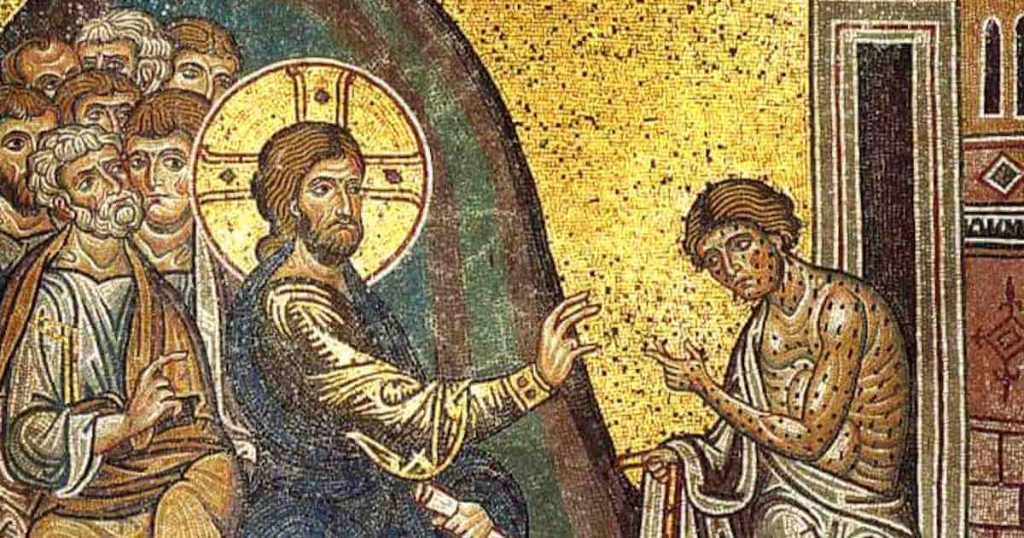
Perhaps we can focus our reflection today on a symbol that is very important in Christian iconography: THE HEART.
The title of this homily is CHIFFON CAKE HEART — my English translation for the Pinoy concept of “pusong mamon.”
Our Gospel is obviously a repetition of the story of the healing of the leper. But last week we reflected on the version of St. Luke. Today we reflect on St. Mark’s version of the same story. Is there a difference, you might ask? Well, a very slight but very significant difference.
Mark tells us explicitly why Jesus dared to do something he was not supposed to do — namely, touch the leper. Why? Because he was touched by the man’s pitiful condition. “Moved with pity… he touched the leper.” In Tagalog, you might describe Jesus as a man with a CHIFFON CAKE HEART (pusong mamon).
Soft cakes, like chiffons, move. And you know that when something is soft and delicate, we are all the more tempted to touch it. What was it that touched Jesus’ heart about the man’s situation?
That this human being had become so dehumanized; that instead of getting some help or care for his disease, he was treated as an outcast; that he was condemned to go through a kind of suffering you would not wish even on animals. Perhaps he was also moved that people were no longer moved at all by the plight of a fellow human being.
They say Christianity was the very first to propose the equality of all human beings in dignity. That nobody deserves to be treated as a non-human. That you cannot allow the humanity of your fellow human beings to be desecrated without, in effect, desecrating your own humanity.
We have a word for this: COMPASSION. In Tagalog, we call it MALASAKIT. It is like feeling the pain of your fellow human being as your own pain. It is about suffering when you witness the suffering of your neighbor, and being moved into action to ease your neighbor’s suffering precisely to ease your own.
In the Book of Exodus, before Moses discovered that he was actually the son of a Hebrew slave, he did not know why he felt so strongly about the sufferings of the Hebrew slaves.
We’re told that he even got into trouble for defending a slave who was being maltreated by an Egyptian task master.
At some point he found himself running away from the comfort of Pharaoh’s palace, settling in Midian, working as a shepherd for Jethro, marrying a girl and having a child with her. He thought he would find peace that way, until God spoke to him through the burning bush.
The revelation is about a God who feels the pain of his people, and who allows Moses to be disturbed by this pain.
The problem with having a chiffon cake heart is, you suffer the consequence of being compassionate.

Our Gospel tells us because Jesus cared for the marginalized, he ended up being marginalized himself. It’s like he switched places with the leper and became an outcast himself.
Isn’t this what Jeremiah lamented about when he lent his prophetic voice to God’s anger about the injustices in Israelite society? At some point, Jeremiah himself became so miserable, he resolved to call it quits, to resign from his prophetic ministry and to just shut up his mouth. But after a while he says to himself, “But when I do this, your words burn in my heart; they are imprisoned in my bones. I cannot endure the pain.”
Our first reading from the letter to the Hebrews speaks about the opposite of the chiffon-cake heart: a “hardened heart,” a “heart that goes astray.” It begins with a long quotation from Psalm 95, which we pray every day in the invitatory antiphon for morning prayers.
It says: “Today, listen to the voice of the Lord; DO NOT HARDEN YOUR HEARTS as at Meribah and Massah where they challenged me and provoked me although they have seen all of my works. Forty years I endured that generation, I said, ‘They are a people WHOSE HEARTS GO ASTRAY and they do not know my ways, so I swore in my anger THEY SHALL NOT ENTER INTO MY REST.”
The psalm has a serious warning for people with hardened hearts, for people who have become apathetic and totally indifferent towards sufferings of their fellow human beings. It says, THEY WILL NOT ENTER INTO GOD’S REST.
Meaning, like Cain, they will be like restless wanderers; their hearts will never have peace because they do not know the way of the Lord, namely, the way of compassion.
If hardened hearts can lead us to damnation, chiffon cake hearts lead us to salvation. When our hearts can feel the pain of others, we save our humanity. One of my favorite icons of Christ is that of the “Sacred Heart.”
Jesus points at his heart that is exposed, pierced with a crown of thorns and bleeding, but it is a heart that is on fire. It is supposed to be our image for divine love. That is why, on first Fridays, we sing “O Sacred Heart, O Love Divine, do keep us near to Thee; and make our hearts so like to Thine that we may holy be.”
This is the homily of Bishop Pablo Virgilio David for Jan. 14, 2021, Thursday of the 1st Week in Ordinary Time, Mk 1:40-45
Source: Licas Philippines
0 Comments